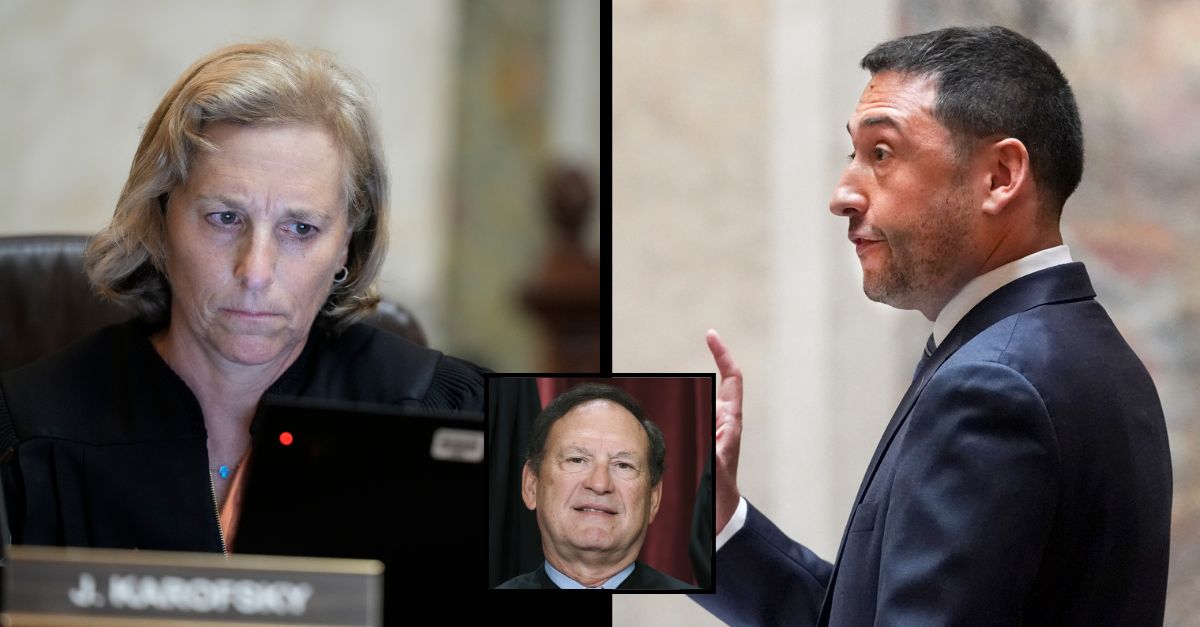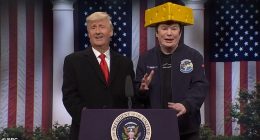
Left: Wisconsin Supreme Court Justice Jill J. Karofsky is seen during a public hearing Thursday, Sept. 7, 2023, in Madison, Wis. (AP Photo/Morry Gash). Right: Republican legislators’ attorney, Misha Tseytlin speaks during oral arguments before the Wisconsin Supreme Court in 2019. (Steve Apps/Wisconsin State Journal via AP). Inset: FILE – Associate Justice Samuel Alito joins other members of the Supreme Court as they pose for a new group portrait, Oct. 7, 2022, at the Supreme Court building in Washington. (AP Photo/J. Scott Applewhite, File)
A justice of the Wisconsin Supreme Court threw Supreme Court Justice Samuel Alito’s words back at a conservative lawyer urging the court to keep absentee ballot drop boxes illegal.
Wisconsin’s top court heard oral arguments Monday in a lawsuit in which a progressive super PAC is seeking to undo the state’s prohibition on absentee ballot drop boxes. The appeal seeks to overturn a recent decision disallowing drop boxes made when the court had a different ideological makeup.
In 2022, the Wisconsin Supreme Court, which had a conservative majority at the time, banned the use of ballot drop boxes. The author of the majority opinion was Justice Rebecca Grassl Bradley, who said that the “illegality” of drop boxes “weakens the people’s faith that the election produced an outcome reflective of their will.”
Bradley even wrote a separate concurrence in the case in which she said the court should overrule its decision throwing out Donald Trump’s challenges to the 2020 presidential election,
The breakdown of the Wisconsin Supreme Court flipped from a 4-3 conservative majority to 4-3 liberal control when Justice Janet Protasiewicz was elected in April 2023. The current court has ruled on several hot-button political cases including a redistricting lawsuit over gerrymandered legislative voting maps. The political makeup of the court may be subject to change again as liberal Justice Ann Walsh Bradley recently announced she would not seek reelection when her term expires next year.
During Monday’s oral arguments, Bradley questioned David Fox, the plaintiffs’ lawyer, about whether Wisconsin law specifically references ballot drop boxes. Fox responded that the state’s overall election law requires that ballots be returned to municipal clerks, but leaves open questions as to method. Fox noted during questioning that there was no evidence of fraudulent drop box usage during the 2020 presidential election.
Former Wisconsin Solicitor General Misha Tseytlin represented the defense during oral arguments and urged the court to allow the 2022 decision to stand. Tseytlin, a member of the Federalist Society, was a previous law clerk for U.S. Supreme Court Justice Anthony M. Kennedy, U.S. Circuit Judge Janice Rogers Brown of the D.C. Circuit, and embattled U.S. Circuit Judge Alex Kozinski of the 9th Circuit.
Tseytlin pushed the justices to consider the doctrine of stare decisis — the idea of deference to legal precedent.
Justice Jill Karofsky, a Democrat, seized the opportunity to throw Alito’s words about precedent back to Tseytlin, asking the lawyer what the court should do if it thought the 2022 decision was “egregiously wrong.” The phrase has become inextricable from the U.S. Supreme Court’s bombshell 2022 overruling of Roe v. Wade.
In the ruling, Alito declared that, “Roe was egregiously wrong from the start,” as justification for the Court’s decision to eradicate the decades-old precedent establishing a constitutional right to abortion.
Tseytlin resisted the analogy and instead argued that the drop box question was one that could prompt “reasonable disagreement between justices of good faith.” Later, Tseytlin argued that overturning the 2022 decision on ballot drops would be tantamount to declaring stare decisis “dead.”
In the Supreme Court’s decision in Dobbs v. Jackson Women’s Health Organization, Alito said that stare decisis should not prevent a court from correcting what would otherwise be a “bad decision.” As examples of the Supreme Court’s actions to “correct [their] own mistake[s],” Alito tossed out Brown v. Board of Education, which overruled Plessy v. Ferguson‘s separate-but-equal rule, West Coast Hotel v. Parrish, which revived minimum wage laws for women, and West Virginia Board of Ed. v. Barnette, which overruling a precedent upholding compulsory flag salutes by public school children.
Have a tip we should know? [email protected]







